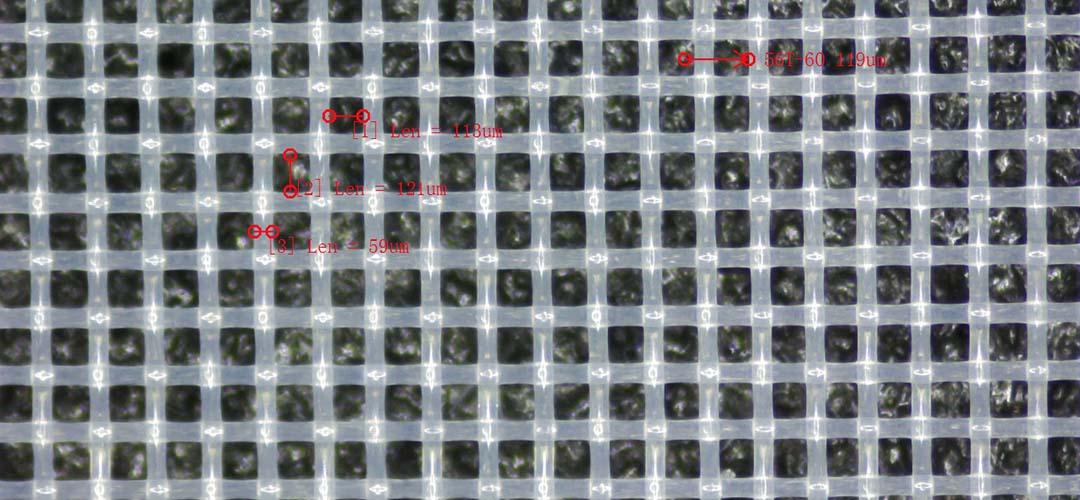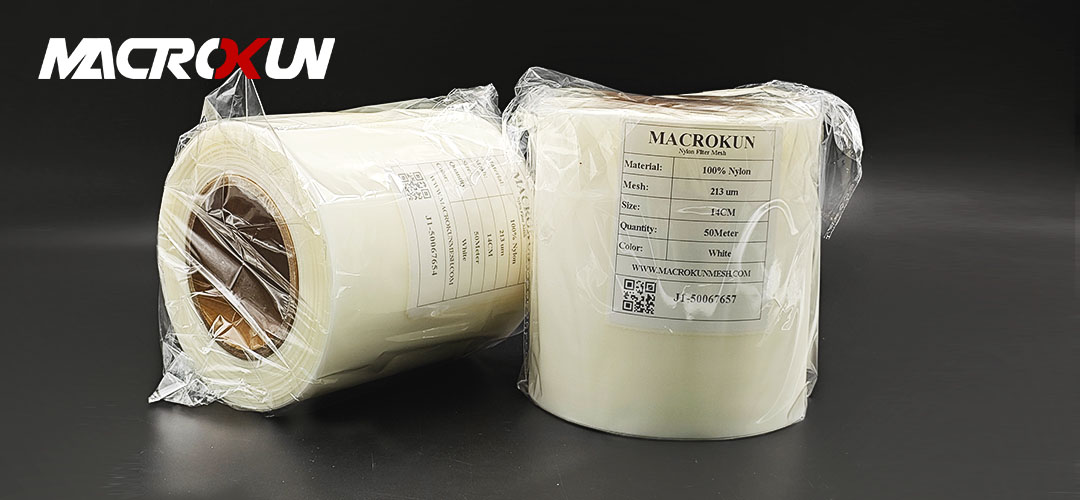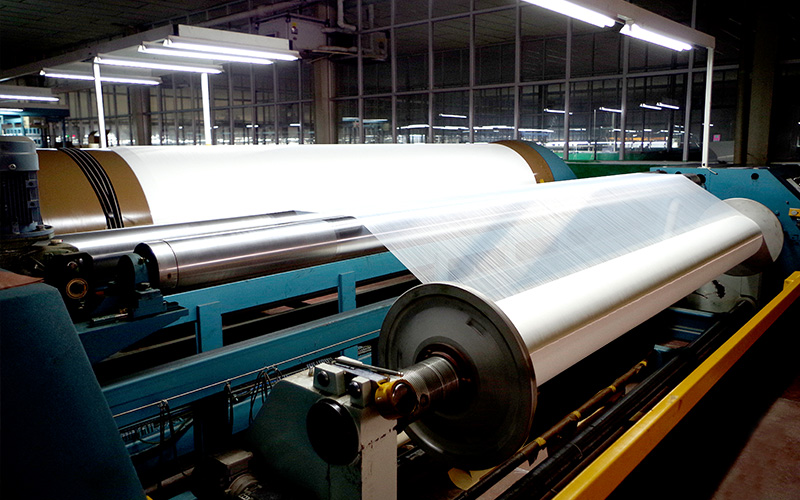Nylon mesh is a popular choice for filter fabrics due to its strength and versatility in filtration applications. This synthetic material offers a number of benefits that make it ideal for use in a wide range of industries, from food and beverage to pharmaceuticals and chemicals.
One of the key advantages of nylon mesh is its durability. Nylon is a strong and resilient material that can withstand high temperatures and harsh chemicals without losing its shape or integrity. This makes it an excellent choice for filter fabrics that need to withstand demanding conditions and provide reliable filtration performance over time.
In addition to its strength, nylon mesh is also highly versatile. It can be woven into a variety of different mesh sizes and shapes to suit the specific needs of different filtration applications. Whether you need a fine mesh for capturing small particles or a larger mesh for faster flow rates, nylon can be customized to meet your requirements.
Another benefit of using nylon mesh for filter fabrics is its resistance to moisture and mold. Nylon is a hydrophobic material, meaning it repels water and resists the growth of mold and mildew. This makes it an excellent choice for applications where moisture is present, such as in food processing or wastewater treatment.
Nylon mesh is also easy to clean and maintain, making it a cost-effective choice for filter fabrics. Unlike some other materials, nylon can be easily washed and sterilized without losing its filtration efficiency. This makes it a practical option for industries that require frequent filter changes or strict cleanliness standards.

Furthermore, nylon mesh is lightweight and flexible, making it easy to handle and install in a variety of filtration systems. Its flexibility allows it to conform to the shape of different filter housings and equipment, ensuring a tight seal and efficient filtration performance.
Overall, nylon mesh offers a number of benefits for filter fabrics, including strength, versatility, durability, resistance to moisture and mold, ease of cleaning, and flexibility. These qualities make it an excellent choice for a wide range of filtration applications, from industrial processes to consumer products.
In conclusion, nylon mesh is a reliable and cost-effective option for filter fabrics that require strength and versatility in filtration. Its durability, resistance to moisture and mold, ease of cleaning, and flexibility make it a practical choice for a variety of industries. Whether you need a fine mesh for capturing small particles or a larger mesh for faster flow rates, nylon can be customized to meet your specific requirements. Consider using nylon mesh for your next filtration project and experience the benefits it has to offer.
Nylon mesh is a versatile material that is commonly used in a variety of filtration systems. Its strength and durability make it an ideal choice for applications where fine filtration is required. Nylon mesh is made from synthetic fibers that are woven together to create a strong, flexible material that can withstand high temperatures and harsh chemicals. This makes it an excellent choice for use in industrial filtration systems where the filtration of liquids and gases is necessary.
One of the key advantages of nylon mesh is its ability to filter out particles of varying sizes. The fine weave of the mesh allows for the filtration of even the smallest particles, making it an effective choice for applications where precision filtration is required. Nylon mesh is also resistant to clogging, which ensures that the filtration system remains efficient over time.
In addition to its strength and durability, nylon mesh is also highly versatile. It can be easily customized to meet the specific requirements of different filtration systems. Nylon mesh can be woven into different shapes and sizes, allowing for the creation of filters that are tailored to the needs of a particular application. This versatility makes nylon mesh a popular choice for a wide range of industries, including pharmaceuticals, food and beverage, and automotive.

Nylon mesh is also easy to clean and maintain, which helps to prolong the life of the filtration system. The material can be easily washed and reused, reducing the need for frequent replacements. This not only saves time and money but also helps to reduce waste and minimize the environmental impact of filtration systems.
Another key advantage of nylon mesh is its resistance to chemicals and corrosion. The material is able to withstand exposure to a wide range of chemicals without degrading, making it an ideal choice for applications where harsh chemicals are present. This resistance to corrosion ensures that the filtration system remains effective and reliable over time.
Overall, nylon mesh is a highly effective material for use in filtration systems. Its strength, versatility, and resistance to chemicals make it an ideal choice for a wide range of applications. Whether filtering liquids or gases, nylon mesh provides a reliable and efficient solution for precision filtration needs. Its ease of customization and maintenance further enhance its appeal, making it a popular choice for industries that require high-quality filtration systems.
In conclusion, nylon mesh offers a combination of strength and versatility that makes it an ideal choice for filtration applications. Its ability to filter out particles of varying sizes, resistance to clogging, and ease of customization make it a highly effective material for use in a wide range of industries. With its durability and resistance to chemicals, nylon mesh provides a reliable and efficient solution for precision filtration needs. Whether used in pharmaceuticals, food and beverage, or automotive applications, nylon mesh is a trusted choice for filtration systems that require high-quality performance.
Nylon mesh filter fabrics are a popular choice for a wide range of filtration applications due to their strength and versatility. These filter fabrics are commonly used in industries such as food and beverage, pharmaceuticals, chemicals, and water treatment. Nylon mesh offers excellent filtration efficiency and can withstand high temperatures and harsh chemicals, making it an ideal choice for demanding filtration processes.
One of the key advantages of nylon mesh filter fabrics is their durability. Nylon is a strong and resilient material that can withstand repeated use without losing its filtration efficiency. This makes nylon mesh filter fabrics a cost-effective option for businesses looking to reduce maintenance and replacement costs. Additionally, nylon mesh is resistant to abrasion and tearing, ensuring that it can withstand the rigors of industrial filtration processes.

In order to maintain the effectiveness of nylon mesh filter fabrics, it is important to follow proper maintenance and cleaning procedures. Regular cleaning of the filter fabric is essential to prevent clogging and ensure optimal filtration performance. When cleaning nylon mesh filter fabrics, it is important to use the right cleaning agents and techniques to avoid damaging the fabric.
One of the most common methods for cleaning nylon mesh filter fabrics is to use a mild detergent and warm water. Simply soak the filter fabric in the detergent solution for a few minutes, then gently scrub the fabric with a soft brush to remove any dirt or debris. Rinse the fabric thoroughly with clean water to remove any remaining detergent residue. It is important to avoid using harsh chemicals or abrasive cleaning tools, as these can damage the nylon mesh and reduce its filtration efficiency.
In addition to regular cleaning, it is also important to inspect nylon mesh filter fabrics for signs of wear and tear. Check the fabric for any holes, tears, or fraying, as these can compromise the filtration performance of the fabric. If any damage is found, it is important to repair or replace the filter fabric as soon as possible to prevent contamination of the filtration process.
Another important aspect of maintaining nylon mesh filter fabrics is proper storage. When not in use, filter fabrics should be stored in a clean, dry environment to prevent mold and mildew growth. It is also important to store filter fabrics away from direct sunlight and heat, as these can degrade the nylon mesh over time.
By following these maintenance and cleaning tips, businesses can ensure the longevity and effectiveness of their nylon mesh filter fabrics. Proper maintenance not only extends the life of the filter fabric but also ensures consistent filtration performance. With its strength and versatility, nylon mesh filter fabrics are an excellent choice for businesses looking for reliable and efficient filtration solutions.
Pre: Nylon Mesh for Filter Sieves: Precision Meets Durability
Next: Why Nylon Mesh for Filter Sieves Is a Key Component in Filtration Systems

MACROKUN has established long-term and stable cooperative relations with many transportation companies such as China Post, DHL, FEDEX, USPS, UPS, etc. Of course, MACROKUN can also provide air and sea transportation. The powerful logistics system enables all MACROKUN'S Printing Mesh, Filter Mesh and Filter Bags and so on to be easily and efficiently transported to any place. For quotes and inquiries, please email our sales team.





